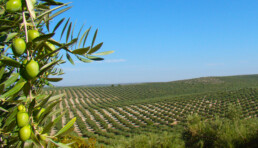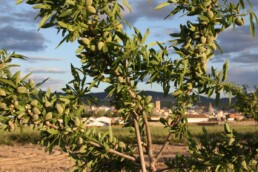Algeria estimates to be one of the largest producers of olive oil
The geographical location of Algeria gives it one of the most favorable climates for olive cultivation. This is stated by Samir Gani, president of the Organizing Committee of the National Competition for the best Algerian EVOO Apuleius and director of the international olive fair S.I.O. Med Mag Oliva Argelia, in the Juan Vilar bulletin.
The olive sector is an important link in the Algerian economy, heritage and culture, and is very present in the Algerian diet that saves the country from importing 120,000 tons of olive oil and 300,000 tons of table olives.
The economic crisis and the fall in oil prices have led the Algerian authorities to opt for a change in their policy and bet on olive growing capable of generating a surplus that will be destined for export, Gani explains to Vilar. Hence the appearance of new olive farms and new territories where olive cultivation did not exist before, such as in the Sahara and in the highlands that are arid and semi-arid zones.
This country has gone from 190,000 to 500,000 hectares of olive groves in less than 20 years, made up of some 160 native olive groves introduced from other Mediterranean countries, with more than 70 native varieties, of which 36 have already been approved.
Export
The future of the olive sector in Algeria, Gani describes as very promising, since he highlights that they have a great margin of development that, from his point of view, will allow them to be among the three largest producers in the world.
Regarding the export, they expect an excess of production in the future. Promoting greater consumption at the local level is their priority, but it will not be enough. To this end, work is being done on optimizing performance, improving quality, creating consortiums; in addition to other actions, such as cleaning up the business environment in Algeria, which will open the door to investment and partnership with foreign operators in a spirit of mutual benefit, Gani points out.
Consumption
The average consumption of olive oil in Algeria is 2.5 liters per inhabitant per year, with peaks in some regions, such as Kabylia, reaching 15 liters / person / year. Likewise, this average consumption is expected to increase in the coming years, since sales prices, which, according to the president of the Organizing Committee, Apuleio, are not affordable for the consumer, begin to fall and consumers are increasingly aware of the benefits of olive oil for your health.
He also adds that supply, which is beginning to exceed demand, is putting pressure on producers to reduce their profit margins.
It also highlights the country's commitment to improving the quality of Argentine olive oil, through awareness campaigns by the specialized international organization, a national contest for the best EVOO, scientific conferences, training in tasting and sensory analysis, which has led to a gradual but radical change in trend, of consumers committed to the demand for quality, that is, for EVOO.
Almond cultivation continues to grow in Extremadura
The area dedicated to almonds continues to grow in Extremadura, which is why the trend of recent years is maintained, thanks to its greater profitability compared to other crops.
The president of COAG Extremadura, Juan Moreno, explained that the total area has grown by one percent this year, reaching 7,600 hectares. This circumstance means that the surface has increased in the last five years more than six percent, he specified.
If the productive area is taken into account, for the first time Extremadura has exceeded 5,000 hectares, reaching 5,420 hectares, and with a production forecast of some 5,400 tons of almond kernels.
This growth is due to the better prices of the almond tree in recent years compared to other crops, and to "its not excessive costs", which guarantees profitability, said Moreno.
However, in recent weeks the almond tree has faced a downward trend in prices, which has not harmed, according to Moreno, the expectations placed on the crop due to the high productivity of the crops.
Moreno explained that, in relation to prices, what happens in California (United States) is very relevant, one of the main producers, which will announce its production in the coming days.
The regional president of COAG warned of the situation that many agricultural sectors in Extremadura may experience due to circumstances such as low prices or the situation of falling consumption generated by the coronavirus crisis.
Examples of key sectors, such as olive groves or vineyards, for which state and regional support measures have been "almost non-existent".
In the latter case, he lamented the absence of support from the central government "aimed at the wine sector", as well as aid for the restructuring and conversion of vineyards, where losses are also expected.
Source: http://valenciafruits.com/el-cultivo-del-almendro-sigue-al-alza-en-extremadura/
Decrease in exports to Russia of wine, pasta, olive oil, coffee and truffles
The export to Russia was drastically reduced after the signing by Russia of decree 778 on August 7, 2014 that stops the import of various food products from various food products from the EU, the United States, Canada, Norway and Australia. Due to the latest EU sanctions applied to Russia, Italy has a significant and growing concern about exports.
Wine, pasta, olive oil, coffee and truffles are the most worrying products, which in 2021 represented 670 million euros of exports.


